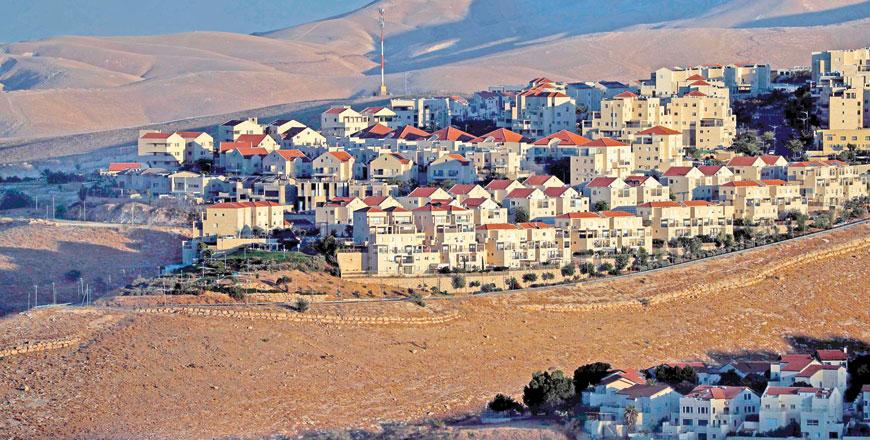You are here
Israel advances plans for more than 2,300 settlement units
By AFP - Aug 06,2019 - Last updated at Aug 06,2019

This photo taken on Tuesday shows the Israeli settlement of Maale Adumim in the occupied West Bank on the outskirts of occupied Jerusalem (AFP photo)
OCCUPIED JERUSALEM — Israel has advanced plans for more than 2,300 settlement units in the occupied West Bank, the latest in a surge of such approvals since US President Donald Trump took office, an NGO said Tuesday.
A defence ministry planning committee issued the approvals while meeting over the past couple of days, the Peace Now NGO said in a statement. The 2,304 settlement units are at various stages in the approval process.
"The approval of settlement plans is part of a disastrous government policy designed to prevent the possibility of peace and a two-state solution, and to annex part or all of the West Bank," said Peace Now, which closely monitors Israeli settlement building.
Israeli Prime Minister Benjamin Netanyahu pledged before April elections to annex settlements in the West Bank, a move sought by the country's far-right.
The settlement movement wields heavy influence in Israeli right-wing politics, and Netanyahu is again up for reelection in new polls on September 17 after he failed to form a governing coalition following the previous vote.
Annexing settlements on a large-scale in the West Bank could prove to be a death knell for the two-state solution, long the focus of international efforts to resolve the Israeli-Palestinian conflict.
Last week, Israel's Cabinet gave rare approval to 700 Palestinian homes in the part of the West Bank under the country's full control while also approving 6,000 units for settlers.
Details of those plans were not publicly released, and some of the 6,000 settler units may be included in this week's committee approvals, said Peace Now's Hagit Ofran.
The plan for Palestinians, though relatively small and far outweighed by the new settlements, could allow Netanyahu to argue he is making efforts in favour of the White House's long-awaited peace plan.
Trump’s son-in-law and senior aide Jared Kushner visited the region, including Israel, last week to discuss the peace plan.
Kushner has said his plan will not mention a two-state solution because “it means one thing to the Israelis, it means one thing to the Palestinians”.
Legalising wildcat settlements
Trump has swung US policy strongly in favour of Israel since taking office and the Palestinians have already dismissed the upcoming peace plan, calling his administration blatantly biased against them.
Palestinian leaders have boycotted the White House since Trump recognised Jerusalem as Israel’s capital in 2017.
The Jerusalem recognition was part of a series of moves against them by Trump, including cutting hundreds of millions of dollars in aid and shutting the de facto Palestinian embassy in Washington.
Trump has also been far less critical of Israeli settlement building than former president Barack Obama’s administration, and settlement approvals have sharply increased since he took office, Peace Now says.
West Bank settlement plans increased to 6,742 units in 2017 compared with 2,629 the previous year, Obama’s last in office, according to Peace Now.
Another 5,618 settlement units were approved in 2018, the NGO says.
This week’s approvals include the legalisation of three wildcat settlements, known as Givat Salit, Ibei Hanahal and Haroeh Haivri.
All settlements are viewed as illegal under international law, which Israel disputes.
It differentiates between settlements it has approved and those it has not, known as outposts.
It regularly grants retroactive approval to outposts.
According to Peace Now, this week’s approvals also include plans for 194 units in the Ganei Modiin settlement.
It says construction for those plans would occur near Israel’s separation barrier, which cuts off the West Bank.
Israel recently demolished some 70 Palestinian homes — most of which were still under construction — near the separation barrier, saying they were built illegally and were a danger to security.
Peace Now says the Ganei Modiin settlement plans were approved after developers agreed to pay for construction of a high wall for security purposes.
Israel began building the separation barrier during the second Palestinian Intifada and claims it is for security reasons.
Palestinians see it as an “apartheid wall” and a potent symbol of the occupation.
Israel occupied the West Bank and east Jerusalem in the 1967 war. It later annexed East Jerusalem in a move never recognised by the international community.
Related Articles
OCCUPIED JERUSALEM — The Jewish settler population of the Israeli-occupied West Bank grew by 3 per cent to 448,672 in 2018, the main organis
OCCUPIED JERUSALEM — Israel has approved plans for more than 200 new settler units in the occupied West Bank, adding to a sharp increase in
OCCUPIED JERUSALEM — The United States warned Friday that "unrestrained" building of settler units could hinder peace, after Israel approved

















